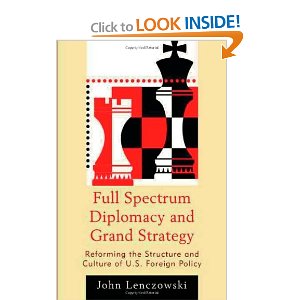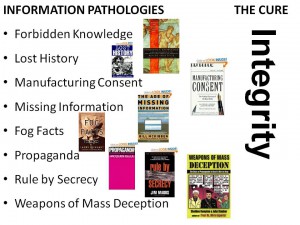
John Lenczowski
5.0 out of 5 stars Long Needed Treatise, But Too Expensive,September 21, 2011
EDIT of 11 December 2011: Gene Poteat, President of the Association of Former Intelligence Officers (AFIO) has an excellent review of this book in the Summer/Fall 2011 issue of Intelligencer. The following quote is from his review, it captures the essence with perfection:
“The weakness and deteriorating standing of America in the world today is the failure to take into account the role of information, disinformation, ideas, values, culture, and religion plays in the influence and conduct of foreign and national security policy.”
While the above glosses over the corporate capture and abject corruption of all three branches of the Federal government, it certainly summarizes and recommends the book in question. See also my graphic, “Information Pathologies,” loaded above next to cover.
End Edit
In the midst of an economic depression, it is a real shame to see a book that is so very relevant to unscrewing the Republic, and also see the same book terribly over-priced. At 230 pages this book should be offered at 24.95, and a donor should be found to permit the author to speak to the Department of State via the Secretary's Open Forum, with a free copy of the book to every person attending.

The author is the founder of the Institute of World Politics, a rather unique institution that offers three Masters programs and that strives to do what no other university can claim: to teach a mastery of all of the instruments of national power, and to teach how culture, ethics, strategy, and philosophy can come together to drive Whole of Government planning, programming, budgeting, and execution so as to advance both the prosperity and the protection of the Republic.
This book came to my attention after I found and truly enjoyed another book out of the Institute of World Policy, by Cultural Intelligence for Winning the Peace by Juliana Geran Pilon. Everything I read about the Institute, or by those associated with it, offers a very strong, coherent, culturally-compelling vision of how to advance positive values inherent in the Declaration of Independence and the Constitution of the United States of America.
Where the author and the book are strongest–beyond five stars–is in their emphasis, insight, and coherence with respect to public diplomacy as a much needed “first string” activity. Today what passes for public diplomacy at the Department of State is a couple of ladies who came up through television broadcasting, are gaga over Silicon Valley, and appear to have no idea how to actually engage in Information Operations (IO), how to create an Autonomous Internet with Liberation Technology including OpenBTS, or even what concepts and cultural values we should be striving to share with the rest of the world.
I suspect the author and I may differ on the role of intelligence–he came up in an era when intelligence was about secret war, strategic analytics (when not demeaned by politicized directors of central intelligence), and an absolute focus on tearing the Soviet Union apart. I came up from the Third World side, and led the totally unsuccessful fight after the demise of the Soviet Union to get one third of the National Intelligence Topics (NIT) directed toward unconventional, asymmetric, and failed state environments, and especially the Southern Hemisphere as a whole. I have also led the Open Source Intelligence (OSINT) movement that 90 countries now get (but not the USA), and am focused now on M4IS2: multinational, multiagency, multidisciplinary, multidomain informtion-sharing and sense-making. I believe a national intelligence community with integrity should not only provide Whole of Government intelligence, but also help the President see how immediately we can cut secret intelligence and defense contracting to achieve savings while also redirecting at least $200 billion toward public diplomacy and strategic commerce as well as global education and influence operations.
Here are a few books that I have been able to enjoy overtime that I believe are complementary to the author's offering, but his book stands alone today, I know of no other that even comes close to addressing what I consider to be a most righteous term, “full spectrum diplomacy.”
Strategic Intelligence and Statecraft: Selected Essays (Brassey's Intelligence & National Security Library)
Modern Strategy
The Search for Security: A U.S. Grand Strategy for the Twenty-First Century
Grand Strategies: Literature, Statecraft, and World Order
Intelligence Power in Peace and War
On Intelligence: Spies and Secrecy in an Open World
THE SMART NATION ACT: Public Intelligence in the Public Interest
The World Is Open: How Web Technology Is Revolutionizing Education (Wiley Desktop Editions)
The Leadership of Civilization Building: Administrative and civilization theory, Symbolic Dialogue, and Citizen Skills for the 21st Century




